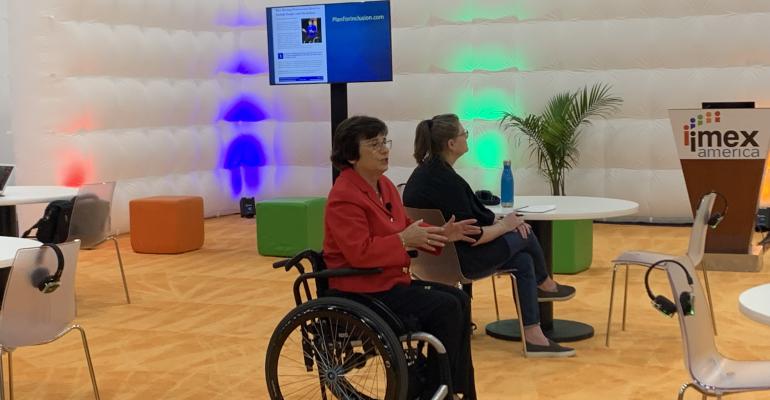When it comes to barriers to participating in events, Rosemarie Rossetti has experienced a whole lot of them. A wheelchair user for more than 20 years, Rossetti is a public speaker who has, more than once, been stymied by a ballroom stage with no ramp, a coach bus with no lift, and other obstacles that were simply overlooked by conference planners.
As she spoke to a group of planners and suppliers during the November IMEX America show in Las Vegas, Rossetti made two key points: First, more than one-quarter of Americans deal with a disability, many of which are not physically noticeable but can significantly diminish the attendee experience. Second, planners must approach each element of their meeting from an inclusive mindset, gathering enough attendee information ahead of the event to ensure a full experience for everyone.
For those with mobility issues—which includes many more people than those who use a wheelchair, scooter, cane, or other mobility aid—easy access to all event areas, thoughtful layouts of meeting rooms, and modified tables and seating must come into play. For instance, “general-session setups need seats removed at the end of some rows to allow for mobility aids, and these areas should be scattered throughout the ballroom,” Rossetti notes. “There should also be tall signage marking those areas so they can be found by attendees who need that space.”
For sessions focused on small-group discussion or networking, at least some of the tables must not be cocktail height. For buffets and other food service, 30-inch tables are best, as is having staffers mindful that some attendees might need assistance being served. And for outdoor events, flooring is a critical consideration: Lawn or beach events might require the use of Mobimats to give everyone access.
One other critical element: An event staffer must be assigned to each mobility-challenged attendee in case an evacuation is required. Exchanging mobile-phone numbers ahead of the meeting ensures that each pair can stay in contact when necessary.
Other Disabilities Must Be Accommodated Too
To ensure a good experience for those with vision, hearing, or learning disabilities, planners should ask questions during the event registration process that elicit enough information to act upon. For instance, many people who have lost some or all of their hearing over their lives tend to do well with headsets or closed captioning in sessions, says Rossetti. On the other hand, she notes that many people who were born deaf might understand content better through sign language.
The lesson, according to Rossetti: Simply asking attendees if they have a disability is not enough. Instead, asking the question, “What would be required of us to accommodate you?” will bring enough information for planners to create scenarios that work for specific attendees.
One final suggestion: Ask the host venue how it has successfully accommodated attendees with specific disabilities. From that question, planners might learn solutions they have not heard before.





